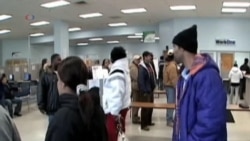The U.S. Congress gets back to work this week after a holiday break. Whether to restore jobless benefits for more than one million long-term unemployed Americans will be among the first items considered in the Democratic-led Senate.
Americans who have been jobless for more than 26 weeks got their last unemployment check a week ago.
Senate Majority Leader Harry Reid has scheduled an initial vote late Monday on a bill to renew compensation for the long-term unemployed by three months. The bill needs bipartisan support to advance.
“The politics of this are pretty strong. The people who are unemployed for long periods of time are Democrats, and they are Republicans,” said Reid.
The effort has the backing of President Barack Obama.
“We do not abandon our fellow Americans when times get tough. We keep the faith with them until they start a new job. If folks cannot pay their bills or buy the basics, like food and clothes, local businesses take a hit and hire fewer workers,” said Obama.
Even if the bill passes the Senate, a vote in the Republican-led House of Representatives is far from assured. Many Republican lawmakers worry about the fiscal impact of another extension of benefits - and the impact on job seekers themselves. Senator Rand Paul is among those opposed to prolonged benefits.
“I think it's wrong to borrow money from China or simply to print up money for it. But I'm not against having unemployment insurance. I do think, though, that the longer you have it, that it provides some disincentive to work,” said Paul.
Democrats see economic benefits if jobless benefits are extended, and political benefits in waging the battle, whether they succeed or not.
Thomas Mann, an analyst at the Brookings Institution, says Republicans are in a tough spot in this battle.
“I think that will be a very, very contentious issue, but it is one where the politics really argue for Republicans finding a way to pass that. It is very unpopular to deny people some support during this difficult time," said Mann.
Republicans, meanwhile, hope to keep the public’s attention focused on the initial problems surrounding President Obama’s signature health care law.
Americans who have been jobless for more than 26 weeks got their last unemployment check a week ago.
Senate Majority Leader Harry Reid has scheduled an initial vote late Monday on a bill to renew compensation for the long-term unemployed by three months. The bill needs bipartisan support to advance.
“The politics of this are pretty strong. The people who are unemployed for long periods of time are Democrats, and they are Republicans,” said Reid.
The effort has the backing of President Barack Obama.
“We do not abandon our fellow Americans when times get tough. We keep the faith with them until they start a new job. If folks cannot pay their bills or buy the basics, like food and clothes, local businesses take a hit and hire fewer workers,” said Obama.
Even if the bill passes the Senate, a vote in the Republican-led House of Representatives is far from assured. Many Republican lawmakers worry about the fiscal impact of another extension of benefits - and the impact on job seekers themselves. Senator Rand Paul is among those opposed to prolonged benefits.
“I think it's wrong to borrow money from China or simply to print up money for it. But I'm not against having unemployment insurance. I do think, though, that the longer you have it, that it provides some disincentive to work,” said Paul.
Democrats see economic benefits if jobless benefits are extended, and political benefits in waging the battle, whether they succeed or not.
Thomas Mann, an analyst at the Brookings Institution, says Republicans are in a tough spot in this battle.
“I think that will be a very, very contentious issue, but it is one where the politics really argue for Republicans finding a way to pass that. It is very unpopular to deny people some support during this difficult time," said Mann.
Republicans, meanwhile, hope to keep the public’s attention focused on the initial problems surrounding President Obama’s signature health care law.





